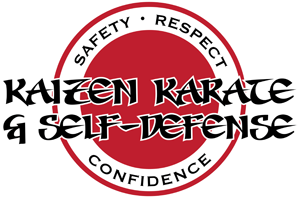Our style of Karate at Kaizen Karate & Self-Defense is primarily a "stand-up" martial art, where the student learns striking, blocking, and kicking. In that realm, our style is more "strike-heavy" compared to some other Karate or Tae Kwon Do styles, which may involve a lot of jump and acrobatic kicks, and are more "kick-heavy."
While our students do a lot of kicking and learn many different types of kicks (front kick, side kick, roundhouse kick, hook kick, etc.), our katas (forms) have a bigger focus on blocking, stances, and striking with hand speed.
Those new to martial arts training will often ask about the difference between Karate and Brazilian Jiu-Jitsu, which is another awesome martial art. These two martial arts are very different. While Karate is primarily "stand-up," Brazilian Jiu-Jitsu is primarily "ground" and more similar to wrestling and grappling.
In our style of Karate, students will learn some ground survival techniques, such as how to keep a bully/bad guy from getting on top of them, and how to fight off an attacker choking them on the ground, for example. However, the majority of our Karate training is "stand-up," where the student is on his or her feet, not on the ground.
